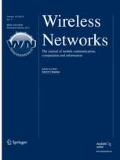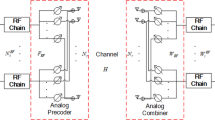Abstract
In massive multiple-input multiple-output systems, due to high cost and power consumption, unconstrained fully digital precoding is excluded for its requirement of dedicated radio-frequency (RF) chains per antenna element. Therefore, hybrid digital/analog precoding solution is deemed as the most potential candidate. In this paper, based on the singular value decomposition (SVD) technique, a low-complexity yet high performance precoding strategy is proposed. Specifically, through the operation of the SVD technique on the fully digital precoding matrix, the eigenvectors with the same number of the data streams are selected out to capture the angle information of the analog phase shifters. To obtain the remaining required eigenvectors, the relativity information between the left decomposed matrix and the optimal fully digital precoding matrix is exploited. In this way, the resultant hybrid analog/digital precoding is realized in a low complexity manner. Simulation results show that the spectral efficiency achieved by our proposed scheme is better compared to that with the orthogonal-matching-pursuit (OMP) scheme in most of the practical scenarios when the number of data streams is equal to that of RF chains, and is very close to that by the OMP scheme when the number of data stream is less than that of RF chains.










Similar content being viewed by others
Notes
When the number of RF chains is equal to that of the antennas, the system spectral efficiency achieved by the hybrid precoding scheme is as same as that of the fully digital precoding mode.
References
Li, Y., Zhu, X., Liao, C., Wang, C., & Cao, B. (2015). Engergy efficiency maximization by jointly optimizing the positions and serving range of relay stations in cellular networks. IEEE Transactions on Vehicular Technology, 64(6), 2551–2560.
Chen, S., Zhou, J., Zheng, X., & Ruan, X. (2018). Energy-efficient data collection scheme for environmental quality management in buildings. IEEE Access, 6, 57324–57333.
Li, Y., Zhang, Z., Wang, C., Zhao, W., & Chen, H.-H. (2013). Bling cooperative communications for multihop ad hoc wireless networks. IEEE Transactions on Vehicular Technology, 62(7), 3110–3122.
Wang, S., Ruby, R., Leung, V. C. M., & Yao, Z. (2016). A low-complexity power allocation strategy to minimize sum-source-power for multi-user single-AF-relay networks. IEEE Transactions on Communications, 64(8), 3275–3283.
Li, Y., Liao, C., Wang, Y., & Wang, C. (2015). Energy-efficiency optimal relay selection in cooperative cellular networks based on double auction. IEEE Transactions on Wireless Communications, 14(8), 4093–4104.
Naeem, M., Anpalagan, A., Jaseemuddin, M., & Lee, D. C. (2014). Resource allocation techniques in cooperative cognitive radio networks. IEEE Communications Surveys & Tutorials, 16(2), 729–744. (second quarter).
Deng, Q., Li, Z., Chen, J., Zeng, F., Wang, H. M., Zhou, L., et al. (2018). Dynamic spectrum sharing for hybrid access in OFDMA-based cognitive femtocell networks. IEEE Transactions on Vehicular Technology, 67(11), 10830–10840.
Zhao, Q., & Sadler, B. M. (2007). A survey of dynamic spectrum access. IEEE Signal Processing Magazine, 24(3), 79–89.
Zhao, N., Yu, F. R., Jin, M., Yan, Q., & Leung, V. C. M. (2016). Interference alignment and its applications: a survey, research issues, and challenges. IEEE Communications Surveys & Tutorials, 18(3), 1779–1803. (third quarter).
Ma, J., Zhang, S., Li, H., Zhao, N., & Leung, V. C. M. (2018). Interference-alignment and soft-space-resue based cooperative transmission for multi-cell massive MIMO networks. IEEE Transactions on Wireless Communications, 17(3), 1907–1922.
Alkhateeb, A., Mo, J., G.-Prelcic, N., & Heath, R. W, Jr. (2014). MIMO prcoding and combining solutions for millimeter-wave systems. IEEE Communications Magazine, 52(12), 122–130.
Yazdan, A., Park, J., Park, S., Khan, T. A., & Heath, R. W, Jr. (2017). Energy-efficient Massive MIMO. IEEE Microwave Magazine, 18(5), 18–30.
Rusu, C., Méndez-Rial, R., González-Prelcic, N., & Heath, R. W. Jr. (2015). Low complexity hybrid sparse precoding and combining in millimeter wave MIMO systems. In Proceedings of the IEEE international conference on communication, London, UK (pp. 1340–1345).
Dai, L., Gao, X., Quan, J., Han, S., & Chih-Lin, I. (2015). Near-optimal hybrid analog and digital precoding for downlink mmWave massive MIMO systems. In Proceedings of the IEEE international conference on communication, London, UK (pp 1334–1339).
Lee, Y.-Y., Wang, C.-H., & Huang, Y.-H. (2015). A hybrid RF/baseband precoding processor based on parallel-index-selection matrix-inversion-bypass simultaneous orthogonal matching pursuit for millimeter wave MIMO systems. IEEE Transactions on Signal Processing, 63(2), 305–317.
Alkhateeb, A., Ayach, O. E., Leus, G., & Heath, R. W, Jr. (2014). Channel estimation and hybrid precoding for millimeter wave cellular systems. IEEE Journal of Selected Topics in Signal Processing, 8(5), 831–845.
Chen, C.-E. (2015). An iterative hybrid transceiver design algorithm for millimeter wave MIMO systems. IEEE Wireless Communications Letters, 4(3), 285–288.
Ayach, O. E., Heath, R. W. Jr., Rajagopal, S., & Pi, Z. (2013). Multimode precoding in millimeter wave MIMO transmitters with multiple antenna sub-arrays. In Proceedings of the IEEE global telecommunication conference (GLOBECOM), Atlanta, GA, USA (pp. 3476–3480).
Ayach, O. E., Rajagopal, S., A.-Surra, S., Pi, Z., & Heath, R. W, Jr. (2014). Spatially sparse precoding in millimeter wave MIMO systems. IEEE Transactions on Wireless Communications, 13(3), 1499–1513.
Ayach, O. E., Heath, R. W. Jr., Abu-Surra, S., Rajagopal, S., & Pi, Z. (2012). Low complexity precoding for large millimeter wave MIMO systems. In Proceedings of the IEEE international conference on communication, Ottawa, Canada, UK (pp. 3724–3729).
Liu, X., Li, X., Cao, S., Deng, Q., Ran, R., Nguyen, K., et al. (2019). Hybrid precoding for massive mmWave MIMO systems. IEEE Access. https://doi.org/10.1109/ACCESS.2019.2903166.
Yuan, H., An, J., Yang, N., Yang, K., & Duong, T. Q. (2019). Low complexity hybrid precoding for multiuser millimeter wave systems over frequency selective channels. IEEE Transactions on Vehicular Technology, 68(1), 983–987.
Ni, W., Dong, X., & Lu, W.-S. (2017). Near-optimal hybrid processing for massive MIMO systems via matrix decomposition. IEEE Transactions on Signal Processing, 65(15), 3922–3933.
Zhang, D., Wang, Y., Li, X., & Xiang, W. (2018). Hybridly connected structure for hybrid beamforming in mmWave massive MIMO systems. IEEE Transactions on Communications, 66(2), 662–674.
Lin, H., Gao, F., Jin, S., & Li, G. (2017). A new view of multi-user hybrid massive MIMO: Angle division multiple access. IEEE Journal on Selected Areas in Communications, 35(10), 2268–2280.
Chan, W. M., Kim, T., Ghauch, H., & Bengtsson, M. (2016). Subspace estimation and hybrid precoding for wideband millimeter-wave MIMO systems. In Proceedings of the 50th Asilomar conference on signals, systems and computers, Pacific Grove, CA, USA (pp. 286–290).
Rusu, C., M.-Rial, R., G.-Prelcic, N., & Heath, R. W, Jr. (2016). Low complexity hybrid sparse precoding strategies for millimeter wave communication systems. IEEE Transactions on Wireless Communications, 15(12), 8380–8393.
Zhang, D., Pan, P., You, R., & Wang, H. (2018). SVD-based low-complexity hybrid precoding for millimeter-wave MIMO systems. IEEE Communications Letters, 22(10), 2176–2179.
Ni, W., & Dong, X. (2016). Hybrid block diagonalization for massive multiuser MIMO systems. IEEE Transactions on Communications, 64(1), 201–211.
Gao, X., Dai, L., Yuen, C., & Wang, Z. (2015). Turbo-like beamforming based on Tabu search algorithm for millimeter-wave massive MIMO systems. IEEE Transactions on Vehicular Technology, 65(7), 5731–5737.
Raghavan, V., Subramanian, S., Cezanne, J., Sampath, A., Koymen, O. H., & Li, J. (2017). Single-user versus multi-user precoding for millimeter wave MIMO systems. IEEE Journal on Selected Areas in Communications, 35(6), 1387–1401.
Dsouza, K. B., Prasad, K. N. R. S. V., & Bhargava, V. K. (2018). Hybrid precoding with partially connected structure for millimeter wave massive MIMO OFDM: A parallel framework and feasibility analysis. IEEE Transactions on Wireless Communications, 17(12), 8108–8122.
M.-Rial, R., Rusu, C., G. -Preleic, N., Alkhateeb, A., & Heath, R. W, Jr. (2016). Hybrid MIMO architectures for millimeter wave communications: phase shifters or switches? IEEE Access, 4, 247–267.
Qin, Q., Gui, L., Cheng, P., & Gong, B. (2018). Time-varying channel estimation for millimeter wave multiuser MIMO systems. IEEE Transactions on Vehicular Technology, 67(10), 9435–9448.
Vlachos, E., Alexandropoulos, G. C., & Thompson, J. (2018). Massive MIMO channel estimation for millimeter wave system via matrix completion. IEEE Signal Processing Letters, 25(11), 1675–1679.
Gao, Z., Hu, C., Dai, L., & Wang, Z. (2016). Channel estimation for millimeter-wave massive MIMO with hybrid precoding over frequency-selective fading channels. IEEE Communications Letters, 20(6), 1259–1262.
Liu, A., Lian, L., Lau, V. K. N., & Yuan, X. (2018). Downlink channel estimation in multiuser massive MIMO with hidden Markovian sparsity. IEEE Transactions on Signal Processing, 66(18), 4796–4807.
Mawatwal, K., Sen, D., & Roy, R. (2017). A semi-blind channel estimation algorithm for massive MIMO systems. IEEE Wireless Communications Letters, 6(1), 70–73.
Buzzi, S., & D’Andrea, C. (2018). Energy efficiency and asymptotic performance evaluation of beamforming structures in doubly massive MIMO mmWave systems. IEEE Transactions on Green Communications and Networking, 2(2), 385–396.
Lin, X., Wu, S., Jiang, C., Kuang, L., Yan, J., & Hanzo, L. (2018). Estimation of broadband multiuser millimeter wave massive MIMO-OFDM channels by exploiting their sparse structure. IEEE Transactions on Wireless Communications, 17(6), 3959–3973.
Busari, S. A., Huq, K. M. S., Mumtaz, S., Dai, L., & Rodriguez, J. (2018). Millimeter-wave massive MIMO communication for future wireless systems: A survey. IEEE Communications Surveys & Tutorials, 20(2), 836–869. (second quarter).
Gupta, A., & Jha, R. K. (2015). A survey of 5G network: Architecture and emerging technologies. IEEE Access, 3, 1206–1232.
Acknowledgements
This work was supported by the Open Project Program of the Key Laboratory of Universal Wireless Communications (2016-KFKT-2016104), Ministry of Education, the Beijing University of Posts and Telecommunications, in part by the Natural Science Foundation of Hunan Province of China (2017JJ2249), the National Natural Science Foundation of China (61771414), Key point research and invention program in Hunan Province of China (2018GK2014), Research subproject of key R&D plan in Hunan Province (2016JC2021) and Science and Technology on Communication Information Security Control Laboratory.
Author information
Authors and Affiliations
Corresponding author
Additional information
Publisher's Note
Springer Nature remains neutral with regard to jurisdictional claims in published maps and institutional affiliations.
Rights and permissions
About this article
Cite this article
Wang, S., Li, L., Ruby, R. et al. A general hybrid precoding scheme for millimeter wave massive MIMO systems. Wireless Netw 26, 1331–1345 (2020). https://doi.org/10.1007/s11276-019-02190-5
Published:
Issue Date:
DOI: https://doi.org/10.1007/s11276-019-02190-5




